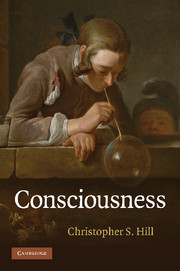Book contents
- Frontmatter
- Contents
- List of figures
- Acknowledgments
- 1 Forms of consciousness
- 2 Theories of qualia
- 3 Awareness, representation, and experience
- 4 The refutation of dualism
- 5 Visual awareness and visual qualia
- 6 Ouch! The paradox of pain
- 7 Internal weather: The metaphysics of emotional qualia
- 8 Introspection and consciousness
- 9 A summary, two supplements, and a look beyond
- Index
2 - Theories of qualia
Published online by Cambridge University Press: 05 June 2012
- Frontmatter
- Contents
- List of figures
- Acknowledgments
- 1 Forms of consciousness
- 2 Theories of qualia
- 3 Awareness, representation, and experience
- 4 The refutation of dualism
- 5 Visual awareness and visual qualia
- 6 Ouch! The paradox of pain
- 7 Internal weather: The metaphysics of emotional qualia
- 8 Introspection and consciousness
- 9 A summary, two supplements, and a look beyond
- Index
Summary
This chapter is concerned with four widely discussed theories of the metaphysical nature of qualia – qualia physicalism, qualia functionalism, property dualism, and a view I will call Harmanian representationalism. There will be much more discussion of property dualism than of the first two theories, for it is one of my main concerns in the present work to show that property dualism is false. The reader must know how I understand the position, and what I take to be the main motivation for holding it, in order to be able to assess the objections to it that I shall develop. There will also be an extended discussion of Harmanian representationalism. It is a parent of a fifth theory of qualia that I will articulate and defend in later chapters. A discussion of the strengths and weaknesses of Harmanian representationalism will help to set the stage for that fifth account.
PHYSICALISM
As I will understand it here, qualia physicalism (hereafter physicalism, for short) is the view that qualia are reducible to physical properties. “Physical” is being used quite broadly in this formulation. It applies to properties of the sort that are in the domain of physics, but it also applies to properties that belong to the domain of biology. Thus, physical properties include the properties that are studied by neuroscience.
In the most demanding sense of the term, a property P1 is said to be reducible to another property P2 if P1 is identical with P2.
- Type
- Chapter
- Information
- Consciousness , pp. 28 - 68Publisher: Cambridge University PressPrint publication year: 2009

